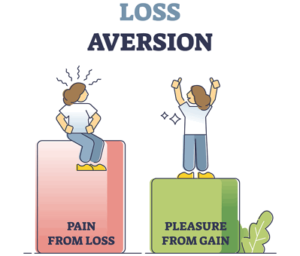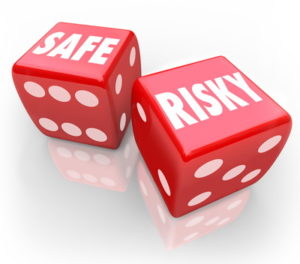 Loss aversion is, as the title suggestions, the desire to avoid losing. It is a common psychological behaviour, given that people don’t want to lose money and therefore do what they can to avoid being in a situation where they might. In the world of betting, this is a tricky thing for punters to have to deal with. On the one hand, losing money is never good, but on the other it can make people take no risks whatsoever.
Loss aversion is, as the title suggestions, the desire to avoid losing. It is a common psychological behaviour, given that people don’t want to lose money and therefore do what they can to avoid being in a situation where they might. In the world of betting, this is a tricky thing for punters to have to deal with. On the one hand, losing money is never good, but on the other it can make people take no risks whatsoever.
People who are loss averse tend to place ‘safe’ bets, often on the favourites or selections expected to win with low odds. This can result in these people winning often but not actually making a profit, so making a loss overall. Loss aversion in the short term can produce more loses in the longer term. The balance is to find valuable odds but this can often mean accepting several loses before a win.
Whether you think that is a good thing or a bad thing will be a matter of personal opinion, but the reality is that the point of betting is to try and win money. With that in mind, avoiding placing bets because of the risk of losing will mean that you’re likely to struggle to achieve the main aim of betting, so it’s difficult to see loss aversion as anything other than a bad thing in these specific circumstances.
Loss Aversion Explained
 First and foremost, let’s take a look at what loss aversion actually is. The idea of making a quick profit is something that everyone can get on board with, whether that be via placing bets or operating in the stock market. The problem is, when you’re gambling you are just as likely to make a loss as a profit if you don’t really know what you’re doing. Loss aversion is the psychological bias in which people are more afraid of the losses they’ll make than the profits.
First and foremost, let’s take a look at what loss aversion actually is. The idea of making a quick profit is something that everyone can get on board with, whether that be via placing bets or operating in the stock market. The problem is, when you’re gambling you are just as likely to make a loss as a profit if you don’t really know what you’re doing. Loss aversion is the psychological bias in which people are more afraid of the losses they’ll make than the profits.
Let’s imagine that someone approaches you and gives you £10. They then take out a coin and say if they roll it and it lands on 1, 2 or 3 then you lose the £10, but if it lands on 4, 5 or 6 you will win £20. This Evens bet on money you didn’t even have a minute ago is a pretty good one, yet studies show that most people won’t take it, afraid as they are of losing the £10 in their hand than winning the possible £20 on offer. In other words, people hate losing more than they love winning. Or another way of putting it is the pain of a loss is greater than the benefit from an equivalent win, we have evolved to be this way.
Indeed, it is believed that people would need to be offered the chance to win £30 before they’d take you up on the roll of a dice, with the change in wealth being the dominant factor that most people consider when they’re offered the bet. It isn’t the only reason, but it is a dominant one and it’s why many people will be risk-averse even if they would naturally consider themselves to be the type to take a risk if the odds were roughly in their favour.
What It Means For Bettors
 Gambling would seem like a natural activity for those that don’t mind risk to engage in. The problem is, this isn’t always the case. People are intrinsically afraid of losing, so they will make decision that they think make it less likely for them to lose. This might seem like it makes sense, but it’s often dominated by the idea that people would feel much happier if they avoided losing than if they succeeded in winning.
Gambling would seem like a natural activity for those that don’t mind risk to engage in. The problem is, this isn’t always the case. People are intrinsically afraid of losing, so they will make decision that they think make it less likely for them to lose. This might seem like it makes sense, but it’s often dominated by the idea that people would feel much happier if they avoided losing than if they succeeded in winning.
This mentality can start to seep into your betting habits, resulting in people often refusing to take a risk if they consider it to be one that might result in them losing. Research into the matter was carried out by Daniel Kahneman and Amos Tversky, with the psychologists discovering that people valued a loss in the same way as a win of up to 2.5 times the size of the loss.
Professional gamblers are people that are able to understand the slings and arrows of outrageous fortune far more than others. They know that gambling will result in them losing every now and again and so they do what they can to mitigate those losses, rather than attempt to avoid them altogether. Anyone placing bets will lose from time to time, that is just a fact of life. It’s how you cope with losses that matters.
Avoiding Falling Foul Of Loss Aversion
 If you want to be a ‘good gambler’, it is important to take a leaf out of the professional gambler’s book and look at every bet that you place as being purely transactional. You cannot get emotionally invested in the world of bets, for this will lead you to make decisions that aren’t for the best. You cannot be emotional about decisions that will see you potentially losing money or you’ll never take a risk.
If you want to be a ‘good gambler’, it is important to take a leaf out of the professional gambler’s book and look at every bet that you place as being purely transactional. You cannot get emotionally invested in the world of bets, for this will lead you to make decisions that aren’t for the best. You cannot be emotional about decisions that will see you potentially losing money or you’ll never take a risk.
The downside of being loss averse is that you will only ever place bets that will win more often than not. This, of course, will bring you some money but it won’t be very much and you will struggle to grow your bankroll betting in such a manner. Of course, this doesn’t mean that you should regularly take huge risks, given that this will increase the likelihood of you putting yourself in a perilous financial situation.
So called ‘professionals’ often bet against the market. Odds are moved by the amount of money staked on a market. If everyone backs Man City to win a football match for example, then the odds of the opponent will lengthen despite their real chances of winning not changing. The trick is to spot when the odds value is higher than the real probability of that outcome and then back it. Of course, this means often backing selections that are not favoured to win but over time those that do win will pay out at a better rate than they should do, which can ensure a profit in the longer term.
For example, you may have to place say 8 bets at 10/1 to win one of them but if those odds are valuable, otherwise known as weak lines, it means when that when that one bet comes in it covers all of the loses of the previous bets and leaves a profit. That does not mean you should always back outsiders, you still need to study the bets to ensure the odds offered are high enough value to justify the risk.
Ultimately to be a successful bettor you have to accept you will lose and probably lose more bets than you win. The overall game is to make a profit in the end not to win an individual bet. You can lose the battle but still win the war. Treat every bet individually on its own merits and don’t allow prior results to influence you. Of course this makes betting transactional and some people do not enjoy that, but it all depends what you are betting for. Are you betting to make a profit or betting just to increase your enjoyment of an event?
Everything In Moderation
 Ask a doctor what you should do about your diet and the chances are high that they will tell you to think about everything in moderation. It’s perfectly ok to have a small amount of chocolate every now and then, but it’s not ok to eat a family-sized bar every single night. Yes, eating more greens is good for you, but a balance of nothing but greens will result in your diet lacking certain important vitamins and minerals.
Ask a doctor what you should do about your diet and the chances are high that they will tell you to think about everything in moderation. It’s perfectly ok to have a small amount of chocolate every now and then, but it’s not ok to eat a family-sized bar every single night. Yes, eating more greens is good for you, but a balance of nothing but greens will result in your diet lacking certain important vitamins and minerals.
When it comes to eating, having a little bit of everything in moderation is the right way forward. Studies show that a small amount of wine is good for you, but an entire bottle is not. The same is true when it comes to gambling, where a small amount of risk will increase your chance of winning a larger amount of money than if you just bet risk-free every single time that you place a wager on a sport or a game.
It is vitally important that you are able to keep your gambling in check and should seek help if you ever find yourself in a situation where you feel as though it’s not. That doesn’t mean that you should barely ever risk anything, however. Moderation is the key word when it comes to placing bets, so you should be loss averse when evaluating markets but find value where you can.
We need to listen to our brains when they are telling us to be loss averse, but at the same time it is crucial that we don’t go so far down that road that we end up not placing good bets when they’re available. We always encourage you to do as much research as you can when you’re thinking of placing a bet, so use this research to dispassionately evaluate every bet you place. You’ll still lose sometimes, but that doesn’t mean you need to throw the baby out with the bathwater.
